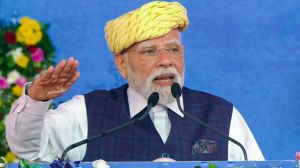Some panic but no Indian exodus yet from Kuwait
Yes, there was panic as the air raid sirens sounded alarm all over Kuwait yesterday. For the Kuwaitis and the huge expatriate community, the...

Yes, there was panic as the air raid sirens sounded alarm all over Kuwait yesterday. For the Kuwaitis and the huge expatriate community, the largest of which is the 370,000-strong Indian community, the fears of a chemical attack seemed real and credible. What made the difference was the determination of the Indian expatriates to continue with their regular work.
So, while most of the Kuwaitis stayed at home, for the Indian workers and office-goers, it was business as usual on the first day of the war. ‘‘I am at work,’’ said Dr Narayan Nampoory, Head of the Nephrology Department, Mubarak Ali Hospital.
Nurses, workers at construction sites, those employed in the petroleum sector and even the taxi drivers — all Indians — were at work. ‘‘Most of the taxis that you see today are driven by Indians,’’ said Javed, a Hyderabadi.
According to Indian Ambassador Swashpawan Singh, ‘‘the Indians are a preferred community in Kuwait.’’ Unlike the Pakistanis and Bangladeshis, they stay away from criminal activities like drug peddling and bootlegging. The image of the Indian unskilled immigrant worker has been replaced by that of a burgeoning professional class of Indian teachers, doctors, engineers, nurses and even officers employed in the Kuwaiti civil service.
‘‘The only community in Kuwait — and that includes the Kuwaitis themselves — who have almost a negligible crime rate is the Indian community,’’ says Dr Ali Tarrah, Dean, College of Social Sciences, Kuwait University.
The government of Kuwait has in public announcements through the local media requested the expatriate community not to panic and assured of emergency facilities in the event of a chemical attack. Czech NBC units have been patrolling localities in which Indians stay in large numbers like Salmiya and Farwaniya.
‘‘The Indians will see through this crisis shoulder to shoulder with their Kuwaiti brothers and sisters. We have been assured of all possible help if an emergency situation does arise. We have supplemented the civil defence plans of the Kuwaiti government by making our own contingency plans. So, we are in place to tackle any unforeseen crisis,’’ said Ambassador Singh.
Since there is still the lurking fear of a chemical attack, it has hastened the expected voluntary departures of some segments of the community. In fact, most of the Indian schools closed four days ago after exams. This is the time for a two-week spring break in all the Indian schools in Kuwait. So many Indian students along with their mothers go back to India. These departures picked up even as the war began. The additional load of people were those who were working on construction, engineering or oil projects which were temporarily suspended because of the war.
‘‘Given the fact that the Indian community is 370,000 strong, a few thousand people leaving cannot in any way be characterised as an exodus,’’ says Ambassador Singh. ‘‘Around 2000 Indians left yesterday on four special flights, there is one afternoon flight to India today which will carry around 400 passengers. But there is no cause for concern because the airport is functioning normally,’’ says K J S Sodhi, Counsellor at the Indian embassy in Kuwait.
‘‘The Indians are not panicking and most of us don’t want to leave,’’ says Garlapati Ashok, an environmental safety engineer with the Kuwait National Petroleum Co.
‘‘In 1990 the situation was different. One fine day people were reduced to poverty, there was no future and they were forced to leave because of the critical situation. This time we have a strong Kuwaiti government which is fully in control,’’ says Dr Nampoory.
Photos



- 01
- 02
- 03
- 04
- 05




























